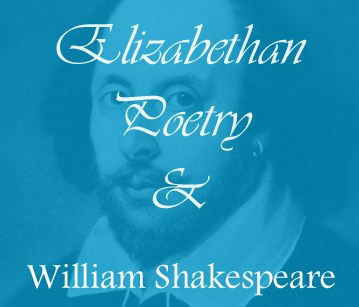Elizabethan Poetry
Elizabethan age was a great age of English literature. During this time the writing of poetry was the part of education among the educated people. That is why many books of poetry by different writers appeared during this age.

The proper Elizabethan literary age began in 1579, but before that year, Sir Thomas Wyatt and Earl of Surrey made their poetic contributions. Sir Wyatt brought the sonnet form Italy and made it popular in England. He followed the tradition of the Petrarchan sonnet with octave and sestet. There was later changed into English sonnet style by Shakespeare, who divided the sonnet into three quatrains summed up by a couplet. The Earl of Surrey wrote the first blank verse in English. The Elizabethan age produced many beautiful lyrics. One of the finest lyricists was Sir Philip Sidney.
William Shakespeare as Poet
The greatest dramatist Shakespeare was also a great poet of this age who wrote around 130 sonnets and they are very famous in English literature. He developed a new form of sonnet called the English sonnet or the Shakespearean sonnet, which rhyme abab cdcd efef gg. It is different from Petrarchan sonnet. Many of his sonnets refer to a girl, a rival poet and a dark-eyed beauty.
Edmund Spencer
Edmund Spencer was a famous poet who introduced the Elizabethan age properly. In 1579, he wrote The Shepherd’s Calendar, a poem in twelve books, one for each month of the year. His greatest work was The Faerie Queen. Though it was planned to be written in twelve books, he could complete six of them. It is an allegorical work with three themes: a political theme, a moral theme, and a fairy tale. More than the story, this work is known for its magic feeling, wonderful music in verse, and the beauty of the sound. It is written in Spenserian stanza of nine lines, with the rhyme scheme ababbcbcc.
Lyrics of the Elizabethan Age
The Elizabethan age produced many beautiful lyrics. One of the finest lyricists was Sir Philip Sidney, who was a courtier, statesman, soldier and a poet. His books of sonnets Astrophel and Stella was printed in 1591, after his death. Another great poet was Sir Walter Raleigh, who was also a soldier, sailor, explorer, courtier and a writer. Some examples of best Elizabethan lyrics can be found in the plays of Shakespeare. His longer poems Venus and Adonis and The Rape of Lucrece are rather cold and without feelings. But the occasional lyrics found in his dramas are full of feelings and passion. The famous dramatist Marlowe has also written some fine lyrics.
The Metaphysical Poets
When the songs and sonnets of the great Elizabethan age passed away slowly, the lyrical power began to lose its force. The following age, the Jacobean Age, was more interested in the mind than in heart or eye. A group of poets, known as the Metaphysical poets, began to write poems which were less beautiful and less musical, but contained tricks of style and strange images. These poets tried to say what they hoped had never been said before. They had their own thoughts and they found their won manner of expressing them. They searched all fields of knowledge, science, as well as, nature, for comparisons. This mad their poetry difficult to understand.
The metaphysical style was started by John Donne, early in the 17th Century. Donne was a lawyer and a priest, and he also wrote religious poetry. He wrote many good things but no perfect poetry. His songs and sonnets are his finest works. He had made good use of direct speech to give a colloquial touch to his poems. He also used dramatic realism in his poetry. He said effective things in a few words.
The Metaphysical element was first seen in the love poems. If followed the example of the Italian writers whom Donne had taken as his masters. Donne’s influence was seen in the religious poets that followed him. One of them was George Herbert. He wrote poetry that was simpler than Donne’s because his experience was narrower. But his imagery appealed to the mind rather than the senses. Henry Vaughan considered both Donne and Herbert as his masters. He was more lyrical and gave sensitive descriptions of nature. Richard Crashaw showed the influence of Donne in the use of conceits. But he gave importance to the emotional and sentimental sides of conceits. Andrew Marvell combined Donne’s wit with lyrical beauty.
